
Franchino Baresi is an Italian football youth team coach and a former player and manager. He mainly played as a sweeper or as a central defender, and spent his entire 20-year career with Serie A club AC Milan, captaining the club for 15 seasons. He is considered to be one of the best defenders of all time. He was ranked 19th in World Soccer magazine's list of the 100 greatest players of the 20th century. With Milan, he won three UEFA Champions League titles, six Serie A titles, four Supercoppa Italiana titles, two European Super Cups and two International Cups, as well as a World Cup with Italy.

Marcel "Marco" van Basten is a Dutch former football manager and player who played for Ajax and AC Milan, as well as the Netherlands national team. Widely regarded as one of the greatest players of all time, he scored 300 goals in a high-profile career, but played his last match in 1993, at the age of 28, due to recurring ankle injury which forced him to announce his retirement two years later. He was later the head coach of Ajax and the Netherlands national team.

Paolo Cesare Maldini is an Italian former professional footballer who played as a left-back or as a centre-back for AC Milan and the Italy national team. He is widely regarded as one of the greatest defenders of all time. As the Milan and Italy captain for many years, he was nicknamed "Il Capitano". Maldini held the record for appearances in Serie A (647), until he was surpassed by Gianluigi Buffon in 2020. He also holds the joint-record for most European Cup/UEFA Champions League final appearances (8) alongside Paco Gento. He was recently a technical director for Milan and is a co-owner of USL Championship club Miami FC.

The FIFA World Player of the Year was an association football award presented annually by the sport's governing body, FIFA, between 1991 and 2015 at the FIFA World Player Gala. Coaches and captains of international teams and media representatives selected the player they deem to have performed the best in the previous calendar year.
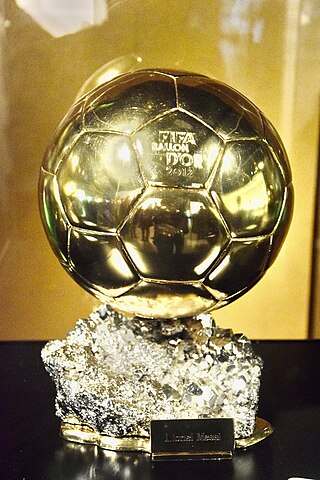
The Ballon d'Or is an annual football award presented by French magazine France Football since 1956 to honour the player deemed to have performed the best over the previous season.
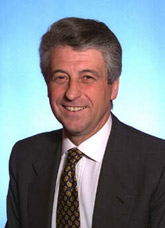
Giovanni "Gianni" Rivera is an Italian politician and former footballer who played as an attacking midfielder.
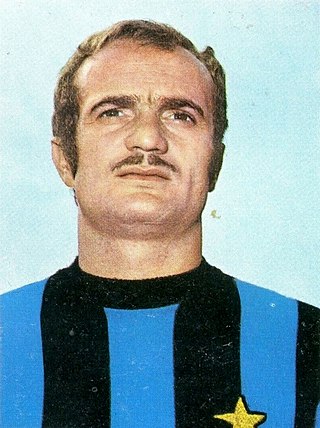
Alessandro "Sandro" Mazzola is an Italian former professional footballer, who played as a forward or attacking midfielder for Internazionale and the Italy national team. He currently works as a football analyst and commentator on the Italian national television station RAI.

Luis Suárez Miramontes was a Spanish professional footballer and manager. He played as a midfielder for Deportivo de La Coruña, España Industrial, Barcelona, Inter Milan, Sampdoria; he also represented the Spain national team between 1957 and 1972. Regarded as one of the greatest Spanish football players of all time, Suárez was noted for his elegant and fluid style of play and also regarded to be one of the best playmakers of his generation.

The 2007 Ballon d'Or, given to the best football player in the world as judged by an international panel of sports journalists, was awarded to Kaká. This was the first year in which players from clubs outside the UEFA federation were eligible for nomination; this change also led to an increase in the voting pool to include journalists from outside UEFA countries.

The 1982 Ballon d'Or, given to the best football player in Europe as judged by a panel of sports journalists from UEFA member countries, was awarded to Paolo Rossi on 28 December 1982.
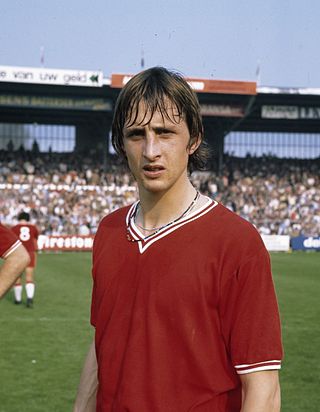
The 1971 Ballon d'Or, given to the best football player in Europe as judged by a panel of sports journalists from UEFA member countries, was awarded to Johan Cruyff on 28 December 1971.

The 2004 Ballon d'Or, given to the best football player in Europe as judged by a panel of sports journalists from UEFA member countries, was delivered to the Ukrainian striker Andriy Shevchenko on 13 December 2004. On 9 November 2004, was announced the shortlist of 50 male players compiled by a group of experts from France Football. There were 52 voters, from Albania, Andorra, Armenia, Austria, Azerbaijan, Belarus, Belgium, Bosnia-Herzegovina, Bulgaria, Croatia, Cyprus, Czech Republic, Denmark, England, Estonia, Faroe Islands, Finland, France, Georgia, Germany, Greece, Hungary, Iceland, Israel, Italy, Kazakhstan, Latvia, Liechtenstein, Lithuania, Luxembourg, Macedonia, Malta, Moldova, Netherlands, Northern Ireland, Norway, Poland, Portugal, Republic of Ireland, Romania, Russia, San Marino, Scotland, Slovakia, Slovenia, Spain, Sweden, Switzerland, Turkey, Ukraine, Wales and Yugoslavia. Each picked a first (5pts), second (4pts), third (3pts), fourth (2pts) and fifth choice (1pt).

The 2002 Ballon d'Or, given to the best football player in Europe as judged by a panel of sports journalists from UEFA member countries, was awarded to Ronaldo on 12 December 2002. This was Ronaldo's second Ballon d'Or, his first award was in 1997.

The 2000 Ballon d'Or, given to the best football player in Europe as judged by a panel of sports journalists from UEFA member countries, was awarded to Luís Figo on 19 December 2000.

The 1986 Ballon d'Or, given to the best football player in Europe as judged by a panel of sports journalists from UEFA member countries, was awarded to Soviet forward Igor Belanov on 30 December 1986. There were 26 voters, from Austria, Belgium, Bulgaria, Czechoslovakia, Denmark, East Germany, England, Finland, France, Greece, Hungary, Italy, Luxembourg, the Netherlands, Poland, Portugal, Republic of Ireland, Romania, Scotland, Soviet Union, Spain, Sweden, Switzerland, Turkey, West Germany and Yugoslavia. Belanov became the third Soviet and the second Ukrainian national to win the award after Lev Yashin (1963) and Oleg Blokhin (1975).
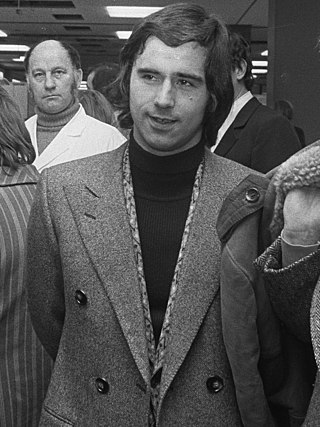
The 1970 Ballon d'Or, given to the best football player in Europe as judged by a panel of sports journalists from UEFA member countries, was awarded to the West German forward Gerd Müller on 29 December 1970. There were 26 voters, from Austria, Belgium, Bulgaria, Czechoslovakia, Denmark, East Germany, England, Finland, France, Greece, Hungary, Italy, Luxembourg, the Netherlands, Norway, Poland, Portugal, Republic of Ireland, Romania, Soviet Union, Spain, Sweden, Switzerland, Turkey, West Germany and Yugoslavia. Müller became the first West German national and the first Bayern Munich player to win the Ballon d'Or.
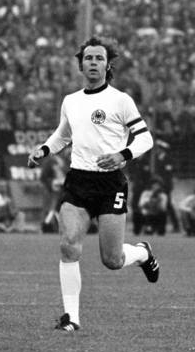
The 1972 Ballon d'Or, given to the best football player in Europe as judged by a panel of sports journalists from UEFA member countries, was awarded to the West German defender Franz Beckenbauer on 26 December 1972. There were 25 voters, from Austria, Belgium, Bulgaria, Czechoslovakia, Denmark, East Germany, England, Finland, France, Greece, Hungary, Italy, Luxembourg, the Netherlands, Poland, Portugal, Republic of Ireland, Romania, Soviet Union, Spain, Sweden, Switzerland, Turkey, West Germany and Yugoslavia. Beckenbauer became the second West German national and Bayern Munich player to win the trophy after Gerd Müller (1970).

The 1974 Ballon d'Or, given to the best football player in Europe as judged by a panel of sports journalists from UEFA member countries, was awarded to the Dutch striker Johan Cruyff on 31 December 1974. There were 26 voters, from Austria, Belgium, Bulgaria, Czechoslovakia, Denmark, East Germany, England, Finland, France, Greece, Hungary, Italy, Luxembourg, the Netherlands, Norway, Poland, Portugal, Republic of Ireland, Romania, Soviet Union, Spain, Sweden, Switzerland, Turkey, West Germany and Yugoslavia. Cruyff became the first footballer to earn the award three times, following up from his wins in 1971 and 1973. French playmaker Michel Platini and Dutch compatriot Marco van Basten also won the Ballon d'Or three times after him.
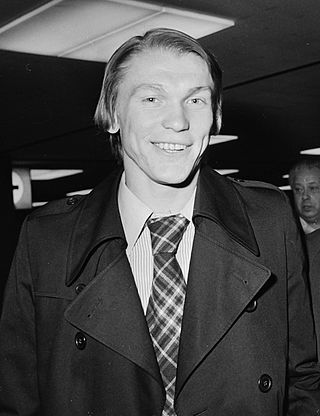
The 1975 Ballon d'Or, given to the best football player in Europe as judged by a panel of sports journalists from UEFA member countries, was awarded to the Soviet forward Oleg Blokhin on 30 December 1975. There were 26 voters, from Austria, Belgium, Bulgaria, Czechoslovakia, Denmark, East Germany, England, Finland, France, Greece, Hungary, Italy, Luxembourg, the Netherlands, Norway, Poland, Portugal, Republic of Ireland, Romania, Soviet Union, Spain, Sweden, Switzerland, Turkey, West Germany and Yugoslavia. Blokhin became the second Soviet footballer who won the trophy after Lev Yashin (1963).


















